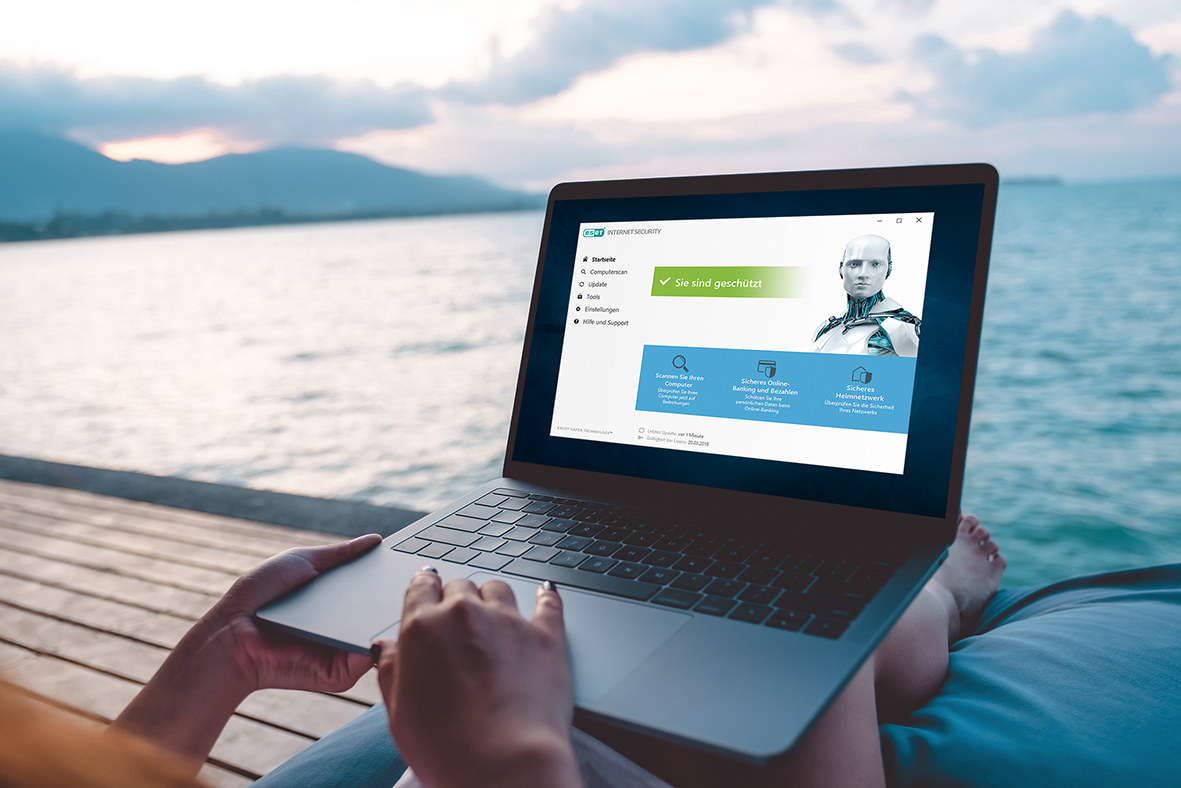Tips for more IT security during the vacations
When traveling, mobile devices such as smartphones, tablets or notebooks have become indispensable companions. The Corona pandemic in particular has made mobile devices even more relevant. That's why cybercriminals are currently looking to profit not only from users' cluelessness while on vacation, but also from the current crisis situation. Tips to avoid unpleasant experiences during or after the vacations.

Even sharing snapshots on social media can quickly be the undoing of travelers. Criminals can quickly gain insight into who is away from home via Facebook and the like. At vacation destinations, data thieves try to steal sensitive data such as credit card information using manipulated public WLAN networks. Security expert Eset recommends that travelers secure their mobile companions comprehensively before the start of their vacation and gives tips on what to take to heart when they are there.
Beware of fake Corona apps
Cybercriminals have been exploiting the Corona pandemic for months - even on vacation. With the help of the Corona warning apps, which are already available in many countries, encounters between app users can be tracked. The aim is to alert people who have been in contact with people who have tested positive. Criminals try to capitalize on this by placing fake apps in the stores. Especially when abroad, vacationers should exercise caution here and not fall for manipulated alert apps. In the future, apps in European countries are to become compatible with each other.
Check supposed WiFi offers carefully
Whether in a mountain hut, a beach bungalow, a campsite or a hotel, most people are looking for relaxation on vacation without having to do without the Internet. Cyber criminals know this, too, and have specially prepared hotspots in use in vacation regions. If vacationers have to enter sensitive data, such as credit card information or Facebook access data, to use the free WLAN, they should not use the offer under any circumstances! The risk of falling for scammers is very high. When using free WLAN hotspots, a VPN solution should also always be used. This technology protects your own data traffic from prying eyes.
Data economy in social networks
One in two people share their travel experiences on social media or a blog. This is the result of a recent survey by the digital association Bitkom. As appealing as it may be to show your sunset snapshot to your friends or relatives back home: Sharing vacation photos on social networks like Facebook or Instagram should be postponed until after your return. There is a high risk of becoming a burglary victim if strangers find out from postings that the house or apartment is empty.
Tips for a safe vacation
– Deploy anti-theft solutions: Smartphones, tablets and notebooks are more easily lost on vacation. To make it difficult for thieves, modern anti-theft modules use the built-in camera, for example, to photograph the perpetrator unnoticed. They also localize the geo-coordinates of the lost device.
– Back up important data: Important data on the smartphone and tablet can be backed up. USB sticks, external hard drives or cloud services are suitable for this. If the hardware is lost, at least the data is not lost and can be restored later.
– Do not download Corona warning apps from abroad: Cyber criminals want to make profit with fake and harmful Corona warning apps. Especially tourists abroad are currently looking for such offers in the app stores. Users should therefore wait until the Corona warning app is compatible with apps from other countries. Until then, an app can only warn, protect mouth-nose protection and distance.
– Update software and security solutions: The operating system, the installed apps and the security solutions used should be up to date. This prevents the exploitation of known security gaps.
– Install security software: Users should install security software on their smartphone, tablet or notebook. In addition to reliable protection against malware and other threats, security solutions that also include functions such as theft protection are recommended.
– Use WiFi hotspots only with VPN connection: Hotels, bars and other locations entice vacationers with free WiFi access. This is particularly practical for long-distance travel, because vacationers often do not have additional SIM cards and their own data volume is limited. However, there is a risk that criminals can spy out sensitive data or important data such as login or credit card details via such a network. Users should therefore additionally secure the connection with a trustworthy VPN solution. However, purchases or financial transactions should be postponed until after the vacation.
– Posting on social media: To avoid making it easier for virtual and real thieves to prepare for a burglary, users should not post anything about their vacation on social media.
– Be careful when paying: Contactless payment is also becoming more and more common at resorts. A special protective cover or wallet shields the credit or debit cards. This prevents thieves from reading the data with special devices. Alternatively, Apple or Google Pay can also be used, depending on the support of the house bank. This increases security during the payment process.
– Disable radio networks: If they are not needed, the Bluetooth and WLAN functions can be deactivated. In this way, users reduce the possible attack surfaces for cybercriminals.
Source: Eset









